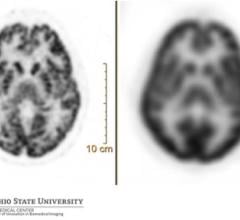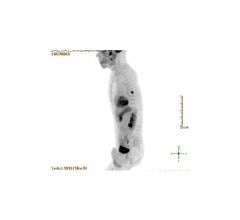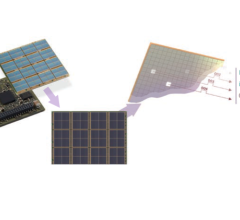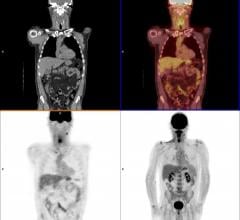May 25, 2016 — Positron emission tomography (PET) is used commonly in the diagnosis of suspected lung cancer. Computed ...
PET Imaging
Positron emission tomography (PET) is a nuclear imaging technology (also referred to as molecular imaging) that enables visualization of metabolic processes in the body. The basics of PET imaging is that the technique detects pairs of gamma rays emitted indirectly by a positron-emitting radionuclide (also called radiopharmaceuticals, radionuclides or radiotracer). The tracer is injected into a vein on a biologically active molecule, usually a sugar that is used for cellular energy. PET systems have sensitive detector panels to capture gamma ray emissions from inside the body and use software to plot to triangulate the source of the emissions, creating 3-D computed tomography images of the tracer concentrations within the body.
May 12, 2016 — A buildup of plaque and dysfunctional proteins in the brain are hallmarks of Alzheimer’s disease. While ...
May 9, 2016 — A recent study demonstrates that Ga-68 DOTATATE positron emission tomography (PET)/computed tomography (CT ...
Digital technology is opening remarkable opportunities for clinical positron emission tomography (PET) about which ...
May 5, 2016 — Carestream now offers an oncology reading workflow for positron emission tomography (PET)/computed ...
Adopting medical technology because it is new or novel lost its luster a long time ago. It is little wonder then that ...
The last 12 months have seen significant growth in the positron emission tomography/computed tomography (PET/CT) segment ...
Precision can have an enormous impact on patients. From diagnosis to patient monitoring (see “How Digital PET/CT Can ...
In the world of molecular imaging, PET/MR is a wild card. But it’s a wild card that’s ready to be played. Three major ...
April 20, 2016 — Mirada Medical announced a new agreement to work with the clinicians and physicists at The Christie ...
It’s been a long time since radiology focused just on the detection of disease. And it will never see those days again ...
PET is getting ready to venture outside oncology, cardiology and mainstream neurology. High on the list of new clinical ...
The intersection between PET/CT and radiation therapy is widening. And it is doing so in unanticipated ways. You might ...
April 13, 2016 — Using positron emission tomography (PET) to guide chemotherapy treatment significantly increases the ...
The good news for molecular imaging is that the latest generation of PET/CT can visualize more and subtler signs of ...
Analog is approximate. Digital is specific. Therein lies the fundamental difference between digital PET and its analog ...
April 5, 2016 — New research shows individuals with a greater degree of activity in the stress center of the brain also ...
March 29, 2016 —A promising new discovery by University of California Los Angeles (UCLA) scientists could lead to a new ...
March 23, 2016 — New research shows that innovative scanning-led surveillance can help identify the need for, and ...
March 16, 2016 — For patients treated with definitive radiation therapy (RT) for oropharyngeal cancer caused by human ...
March 3, 2016 — Participating dementia specialists may now enroll patients in the Imaging Dementia—Evidence for Amyloid ...
February 23, 2016 — The National Institutes of Health recently bestowed a $1.5 million grant on a Washington University ...
February 22, 2016 — A new study suggests that one approach to watching for lung cancer’s return is being inappropriately ...
February 10, 2016 — Patients at Fox Valley Hematology & Oncology’s (FVHO) new cancer care center are receiving a better ...


 May 25, 2016
May 25, 2016 





















